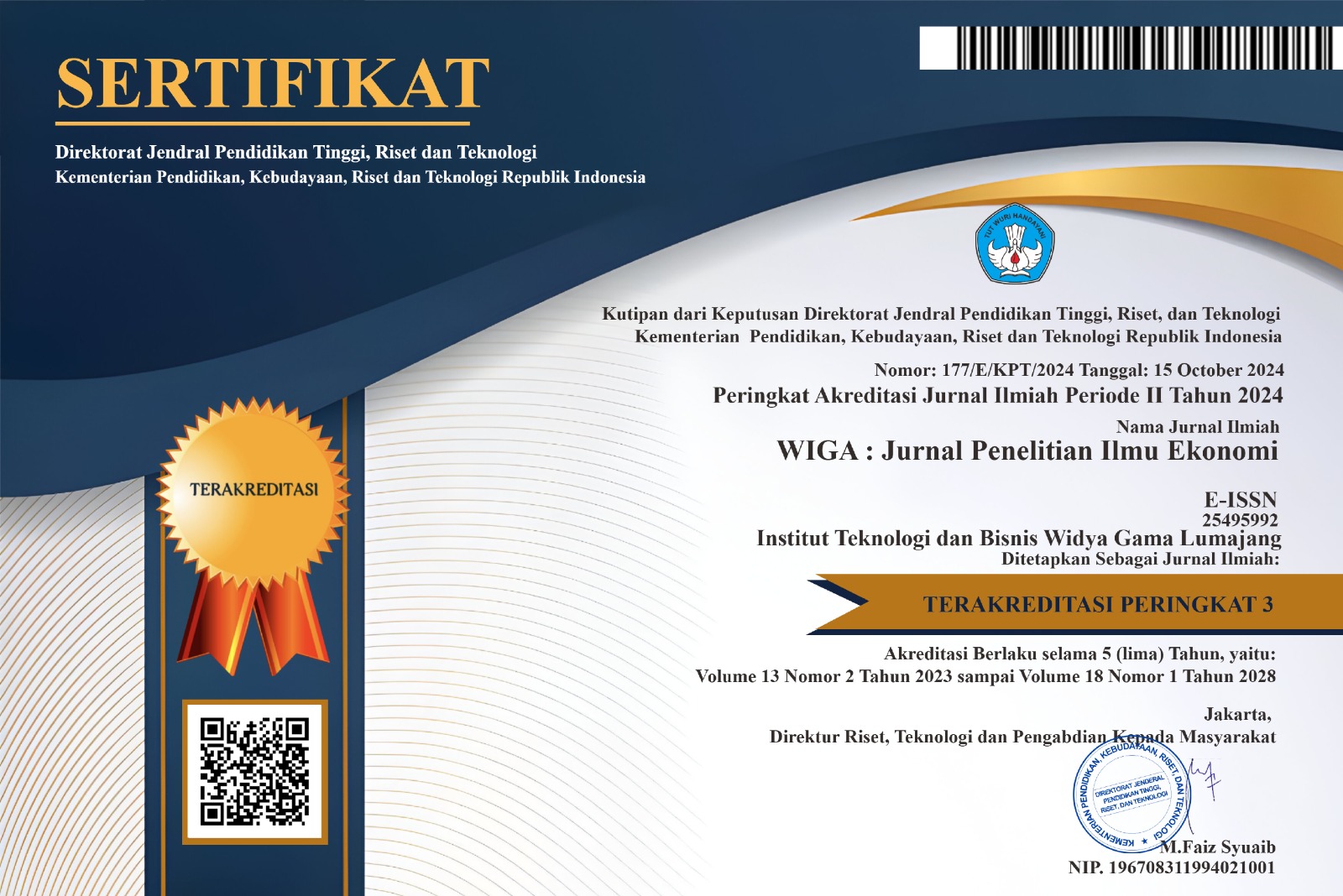Indonesia's Economic Impact of the Carbon Tax
DOI:
https://doi.org/10.30741/wiga.v13i1.970Keywords:
Indonesia’s Economics, Carbon Tax, Climate Change, Carbon Dioxide EmissionsAbstract
What is the impact of the adoption of the carbon tax on climate change, carbon dioxide emissions, and other impacts on the Indonesian economy? is the research question raised in this paper. This study is crucial because although the Indonesian economy hasn't fully recovered, the government has announced plans to impose additional taxes that will burden businesses and industries and may lead to an increase in unemployment as a result of layoffs. This study was inspired by a number of studies on climate change and carbon dioxide emissions that show that, by 2050, the world will become hotter and more people would die from breathing poor air as a result of rising carbon dioxide emissions. The author tries to determine what effect a carbon price might have on Indonesia's economy. Data on the adoption of carbon taxes in 15 countries that have already done so was gathered by the authors between 1990 and 2019. This study adopted a descriptive qualitative methodology. The implementation of carbon taxes in several countries such as Finland and Sweden has proven successful in reducing carbon emissions and does not have a negative impact on their country's economy.
Downloads
References
Baranzini, A., & Carattini, S. (2014). Taxation of Emissions of Greenhouse Gases. In (pp. 543-560). https://doi.org/10.1007/978-94-007-5784-4_90.
Bavbek, G. (2016). Carbon Taxation Policy Case Studies. EDAM Energy and Climate Change Climate Action Paper Series 2016/4.
Bridge, G., Bouzarovski, S., Bradshaw, M., & Eyre, N. (2013). Geographies of energy transition: Space, place and the low-carbon economy. Energy Policy, 53, 331-340. 10.1016/j.enpol.2012.10.066
Carl, J., & Fedor, D. (2016). Tracking global carbon revenues: A survey of carbon taxes versus cap-and-trade in the real world. Energy Policy, 96, 50-77. https://doi.org/10.1016/j.enpol.2016.05.023
Christiansen, L., Bois von Kursk, O., & Haselip, J. A. (2018). UN Environment Emissions Gap Report 2018.
Collier, P. (2008). The Politics of Hunger: How Illusion and Greed Fan the Food Crisis. Foreign Affairs, 87(6), 67-68.
Cresswell, W. J., & Creswell, J. W. (2009). Research Design: Qualitative, Quantitative, and Mixed Methods Approaches. SAGE Publications.
Hoeller, P. & Markku W. (1991). Energy Prices, Taxes and carbon Dioxide Emissions. OECD Economic Studies, 17, 91-105.
Humphreys, J. (2007). Exploring a carbon tax for Australia. Centre for Independent Studies.
IPCC. (2007). Climate Change 2007: The Physical Science Basis. Contribution of Working Group I to the Fourth Assessment Report of the Intergovernmental Panel on Climate Change (IPCC). Cambridge University Press.
Jonsson, S., Ydstedt, A., & Asen, E. (2020). Looking Back on 30 Years of Carbon Taxes in Sweden.
Khastar, M., Aslani, A., & Nejati, M. (2020). How does carbon tax affect social welfare and emission reduction in Finland? Energy Reports, 6, 736–744. https://doi.org/10.1016/j.egyr.2020.03.001
Kossoy, A., Peszko, G., Oppermann, K., Prytz, N., Klein, N., Blok, K., Lam, L., Wong, L., & Borkent, B. (2015). State and Trends of Carbon Pricing 2015. https://www.ncdc.noaa.gov/sotc/global/201 4/13.
Mundial, B. (2018). Doing Business 2018: Reforming to Create Jobs. World Bank Group, Washington.
OECD. (2019). Global Revenue Statistics Database. https://stats.oecd.org/Index.aspx?DataSetCo de=RS_GBL
OECD. (2020). Env ironment at a Glance Indicators- Climate change Climate change Environment at
Rusdianti, I, S., Irmadariyani, R., & Kustono, A. S. (2022). E-Finance: Mitigation of Fraud Tendency in Indonesia. International Journal of Entrepreneurship and Business Development, 5(3), 581-589. https://doi.org/10.29138/ijebd.v5i3.1857
Tabuena, A. C., Hilario, Y. M. C., & Buenaflor, M. P. (2021). Overview and Exemplar Components of the Research Methodology on the Research Writing Process for Senior High School Students. International Journal of Trend in Scientific Research and Development (IJTSRD), 5(3), 117-126.
Downloads
Published
How to Cite
Issue
Section
License
Copyright (c) 2023 Dani Ramdani

This work is licensed under a Creative Commons Attribution-NonCommercial 4.0 International License.










